Fitxak
-
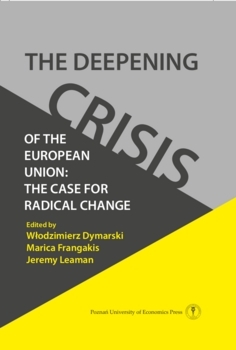 17th Workshop on Alternative Economic Policy in Europe, 16-18 September 2011 at the C3-Center for International Development, Vienna / Austria, organised by the EuroMemo Group
17th Workshop on Alternative Economic Policy in Europe, 16-18 September 2011 at the C3-Center for International Development, Vienna / Austria, organised by the EuroMemo Group -
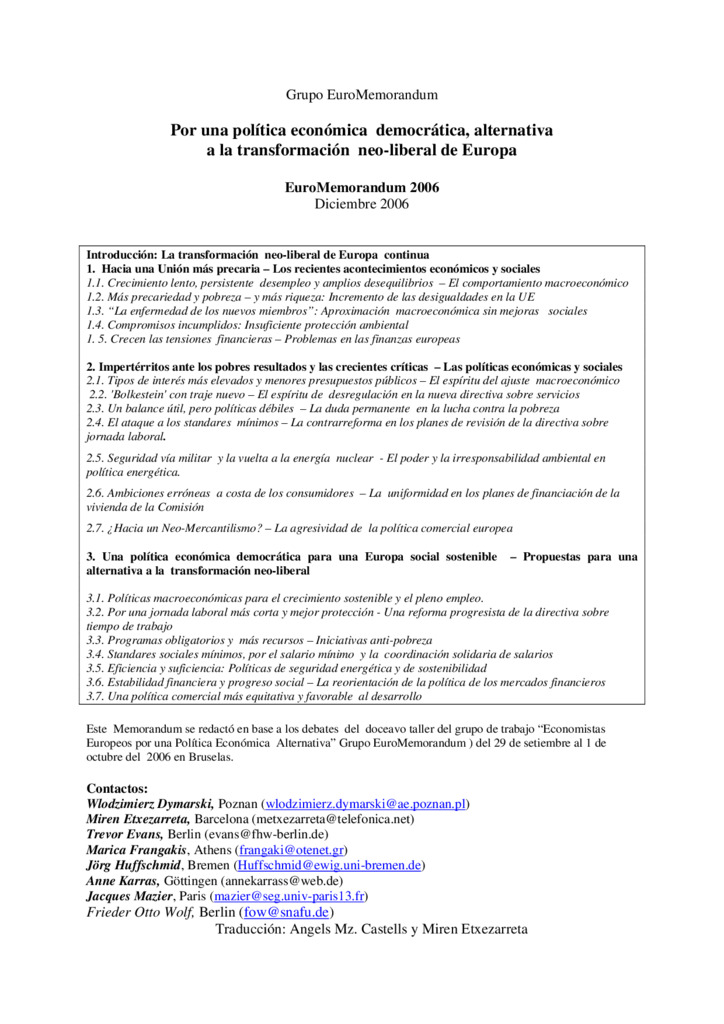 This Memorandum was formulated on the basis of discussions at the 12th workshop of the working group "European Economists for an Alternative Economic Policy” (EuroMemorandum Group) on September 29 - October 1, 2006 in Brussels. The text is available in English, French, German, Greek, Hungarian, Polish and Spanish.
This Memorandum was formulated on the basis of discussions at the 12th workshop of the working group "European Economists for an Alternative Economic Policy” (EuroMemorandum Group) on September 29 - October 1, 2006 in Brussels. The text is available in English, French, German, Greek, Hungarian, Polish and Spanish. -
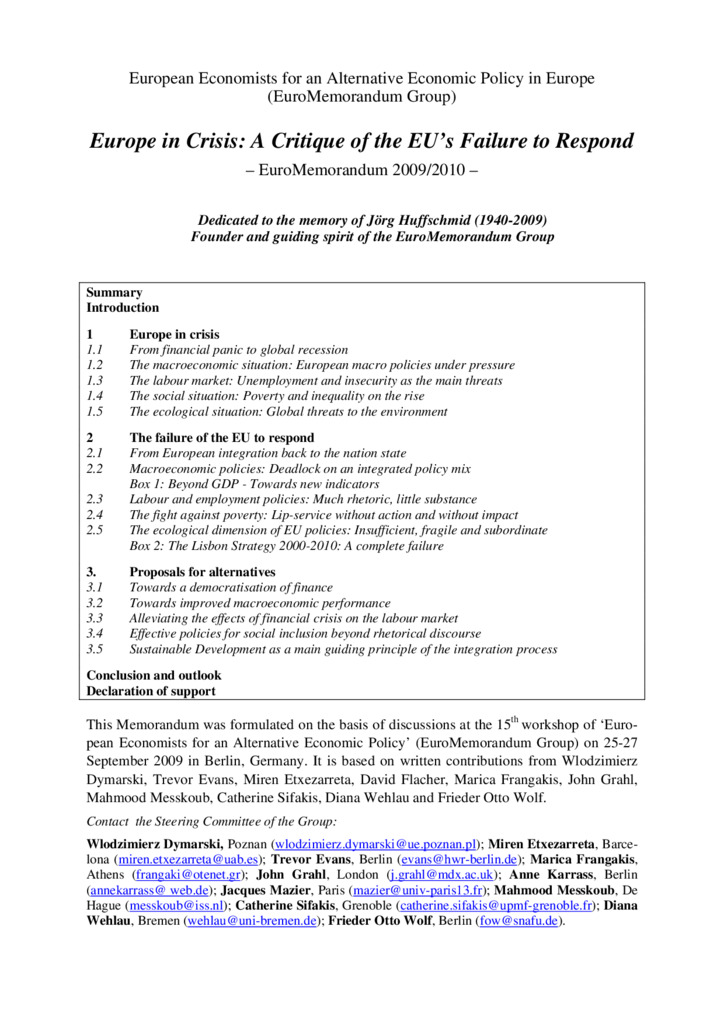 Europe in Crisis: A Critique of the EU’s Failure to Respond - Dedicated to the memory of Jörg Huffschmid (1940-2009), Founder and guiding spirit of the EuroMemorandum Group This Memorandum was formulated on the basis of discussions at the 15th workshop of ‘European Economists for an Alternative Economic Policy’ (EuroMemorandum Group) on 25-27 September 2009 in Berlin, Germany. It is based on written contributions from Wlodzimierz Dymarski, Trevor Evans, Miren Etxezarreta, David Flacher, Marica Frangakis, John Grahl, Mahmood Messkoub, Catherine Sifakis, Diana Wehlau and Frieder Otto Wolf. We have dedicated the EuroMemorandum 2009/10 to the memory of Jörg Huffschmid. The text is available in English, French, German, Greek, and Spanish. Source: EuroMemo Group
Europe in Crisis: A Critique of the EU’s Failure to Respond - Dedicated to the memory of Jörg Huffschmid (1940-2009), Founder and guiding spirit of the EuroMemorandum Group This Memorandum was formulated on the basis of discussions at the 15th workshop of ‘European Economists for an Alternative Economic Policy’ (EuroMemorandum Group) on 25-27 September 2009 in Berlin, Germany. It is based on written contributions from Wlodzimierz Dymarski, Trevor Evans, Miren Etxezarreta, David Flacher, Marica Frangakis, John Grahl, Mahmood Messkoub, Catherine Sifakis, Diana Wehlau and Frieder Otto Wolf. We have dedicated the EuroMemorandum 2009/10 to the memory of Jörg Huffschmid. The text is available in English, French, German, Greek, and Spanish. Source: EuroMemo Group -
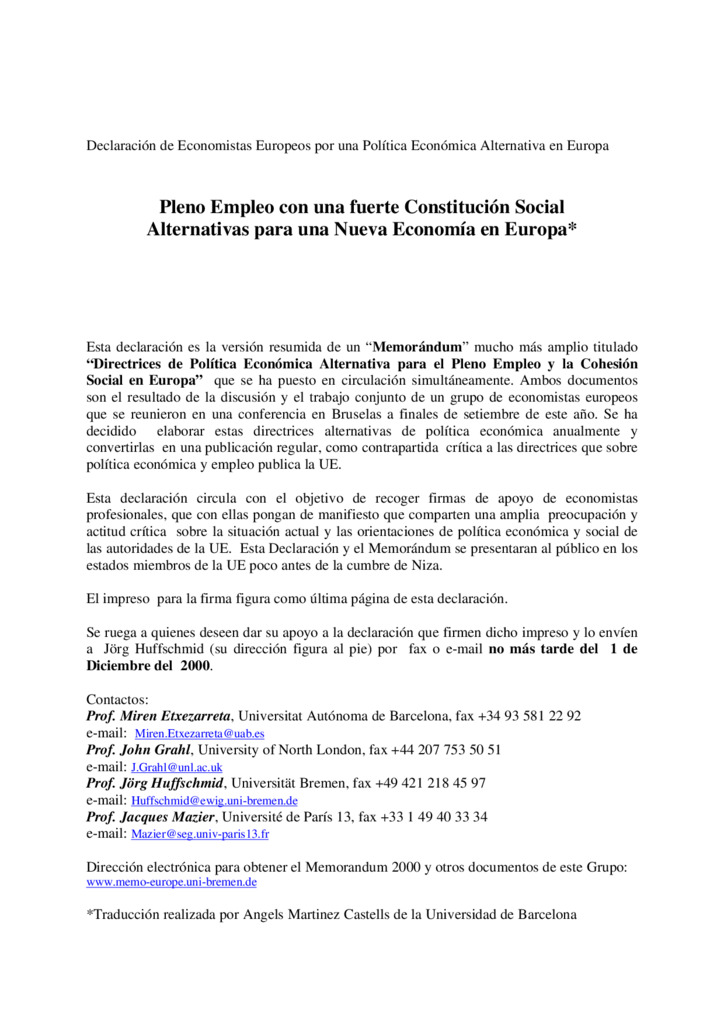 The text is available in English, French, German, Hungarian, Italian and Spanish. Additionally there is a long version in English and German available. Summary 1. Contrary to the very optimistic official presentations to the public, the economic and social situation in the EU must give rise to great concern: the current recovery is fragile, unemployment continues to remain at intolerably high levels, roughly four times the levels of the 1960s, and inequality in all forms is increasingly spreading all over Europe: inequality in income distribution, precarious working conditions, rising poverty, the persistent gender gap and the new dimension of inequalities between Eastern and Western Europe. 2. The economic and social policy of the European Union is criticised because of its uniquely narrow view and approach. On the macroeconomic side the exclusive fixation of monetary policy on price stability and the obsession of fiscal policy with budget deficit reduction have contributed to the current high level of unemployment and are likely to continue to do so in the future. At the same time social policy, under the heading of an "activating welfare state”, is reducing the social content of full employment, eroding social cohesion and solidarity, increasing inequality in many forms, while at the same time imposing more elements of compulsion and repression onto the weaker parts of society. 3. As an alternative to this regressive course of policy we propose - a more efficient and more democratic macroeconomic policy for sustainable growth and more socially rich employment on the way to full employment. Ways to this end are a more expansionary fiscal and a co-operative monetary policy as well as control over exchange rates and financial markets; - a stronger social policy with the aim of creating a social constitution which gives every individual living in the EU the unconditional right to a dignified life. Ways to this end are on the one hand measures to improve the conditions for progressive national policies and on the other hand specific European measures like the adoption of minimum standards for social expenditure in general and for specific purposes like health or child care in particular; - more balanced structural policies with particular emphasis on a more pragmatic view in competition policy, a stronger research and development policy, a strategic industrial policy, a better targeted regional and a more active trade policy; - a better and more determined preparation for Eastern enlargement: the completion of institutional reforms should be dropped as precondition for enlargement, generous transition periods should be negotiated for mutually sensitive areas, and transfer payments should be substantially enhanced in order to facilitate the accession. - The development of conceptions for a more radical restructuring of the economy and society, where not growth but welfare of the people is the central point of reference and individual and collective reproduction will be organised in new ways. Source: ·EuroMemo
The text is available in English, French, German, Hungarian, Italian and Spanish. Additionally there is a long version in English and German available. Summary 1. Contrary to the very optimistic official presentations to the public, the economic and social situation in the EU must give rise to great concern: the current recovery is fragile, unemployment continues to remain at intolerably high levels, roughly four times the levels of the 1960s, and inequality in all forms is increasingly spreading all over Europe: inequality in income distribution, precarious working conditions, rising poverty, the persistent gender gap and the new dimension of inequalities between Eastern and Western Europe. 2. The economic and social policy of the European Union is criticised because of its uniquely narrow view and approach. On the macroeconomic side the exclusive fixation of monetary policy on price stability and the obsession of fiscal policy with budget deficit reduction have contributed to the current high level of unemployment and are likely to continue to do so in the future. At the same time social policy, under the heading of an "activating welfare state”, is reducing the social content of full employment, eroding social cohesion and solidarity, increasing inequality in many forms, while at the same time imposing more elements of compulsion and repression onto the weaker parts of society. 3. As an alternative to this regressive course of policy we propose - a more efficient and more democratic macroeconomic policy for sustainable growth and more socially rich employment on the way to full employment. Ways to this end are a more expansionary fiscal and a co-operative monetary policy as well as control over exchange rates and financial markets; - a stronger social policy with the aim of creating a social constitution which gives every individual living in the EU the unconditional right to a dignified life. Ways to this end are on the one hand measures to improve the conditions for progressive national policies and on the other hand specific European measures like the adoption of minimum standards for social expenditure in general and for specific purposes like health or child care in particular; - more balanced structural policies with particular emphasis on a more pragmatic view in competition policy, a stronger research and development policy, a strategic industrial policy, a better targeted regional and a more active trade policy; - a better and more determined preparation for Eastern enlargement: the completion of institutional reforms should be dropped as precondition for enlargement, generous transition periods should be negotiated for mutually sensitive areas, and transfer payments should be substantially enhanced in order to facilitate the accession. - The development of conceptions for a more radical restructuring of the economy and society, where not growth but welfare of the people is the central point of reference and individual and collective reproduction will be organised in new ways. Source: ·EuroMemo -
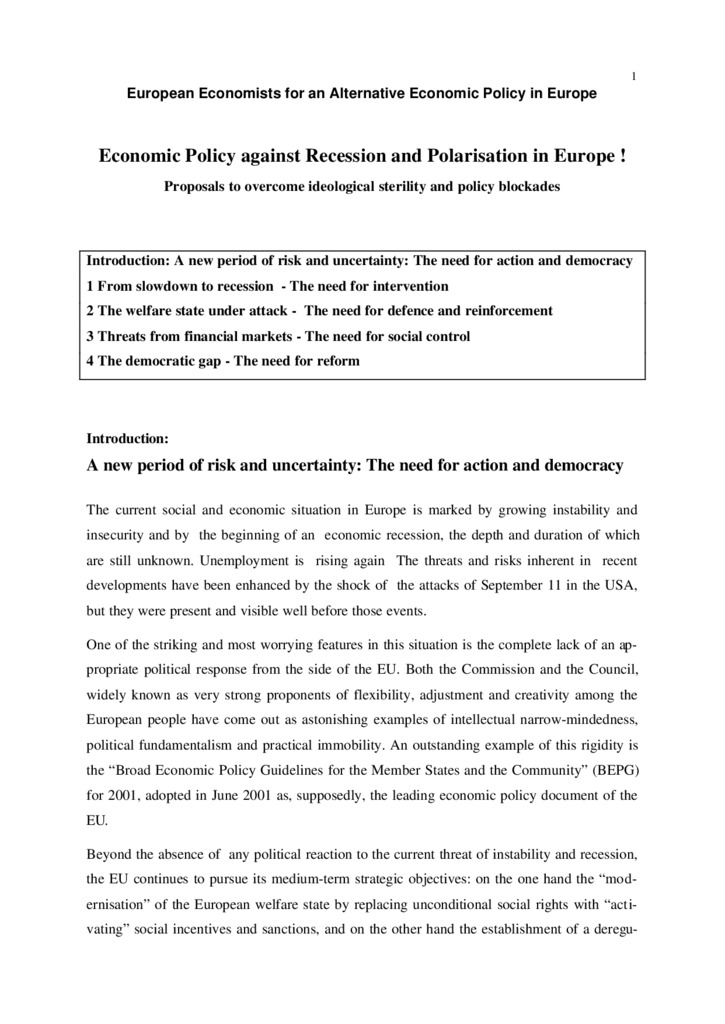 The text is available in English, French, German, Hungarian, Italian and Spanish. Additionally there is a short version in English, French, German, Hungarian, Italian and Spanish available Introduction: A new period of risk and uncertainty: The need for action and democracy 1 From slowdown to recession - The need for intervention 2 The welfare state under attack - The need for defence and reinforcement 3 Threats from financial markets - The need for social control 4 The democratic gap - The need for reform Source: EuroMemo Group
The text is available in English, French, German, Hungarian, Italian and Spanish. Additionally there is a short version in English, French, German, Hungarian, Italian and Spanish available Introduction: A new period of risk and uncertainty: The need for action and democracy 1 From slowdown to recession - The need for intervention 2 The welfare state under attack - The need for defence and reinforcement 3 Threats from financial markets - The need for social control 4 The democratic gap - The need for reform Source: EuroMemo Group -
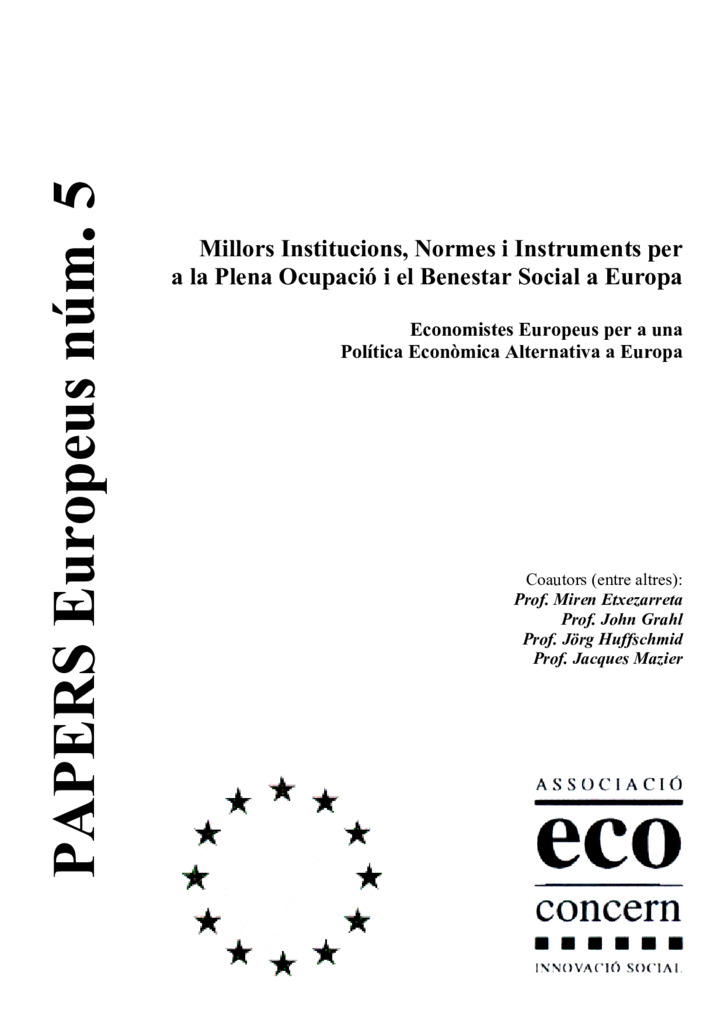 Millors Institucions, Normes i Instruments per per a la Plena Ocupació i el Benestar Social a EuropaThe text is available in Catalan, English, German, Hungarian, Italian and Spanish. Additionally there is a long version in German and English available. Summary 1. Self-Immunisation, False Optimism and Continued Austerity Amidst Growing Uncertainty: The Broad Economic Policy Guidelines (BEPG) 2002 2. The European Social Model - Cornerstones for an Alternative Economic Strategy in Europe 3. Eastern Enlargement - Challenge and Perspective for the European Social Model 4. Better Institutions, Rules and Tools for the European Social Model 4. 1. A framework for a more democratic and more efficient macroeconomic policy 4. 2. A stronger commitment to social welfare 4. 3. Reforming and Strengthening Public Services 4. 4. Enforcing the public interest in financial markets 5. Conclusion Soucer: EuroMemo
Millors Institucions, Normes i Instruments per per a la Plena Ocupació i el Benestar Social a EuropaThe text is available in Catalan, English, German, Hungarian, Italian and Spanish. Additionally there is a long version in German and English available. Summary 1. Self-Immunisation, False Optimism and Continued Austerity Amidst Growing Uncertainty: The Broad Economic Policy Guidelines (BEPG) 2002 2. The European Social Model - Cornerstones for an Alternative Economic Strategy in Europe 3. Eastern Enlargement - Challenge and Perspective for the European Social Model 4. Better Institutions, Rules and Tools for the European Social Model 4. 1. A framework for a more democratic and more efficient macroeconomic policy 4. 2. A stronger commitment to social welfare 4. 3. Reforming and Strengthening Public Services 4. 4. Enforcing the public interest in financial markets 5. Conclusion Soucer: EuroMemo -
 The text is available in English, French, German, Greek, Hungarian, Polish and Spanish. Additionally there is a long version in German and English available. Summary Introduction 1. In the face of stagnation, higher unemployment and social polarization - the need for an economic policy initiative 2. A more favourable economic policy framework to manage enlargement 3. More democracy and less Maastricht needed - Critique of the draft constitution 4. A strong public sector as a pillar of the European social model - Critique of the "Green Paper on Services of General Interest” 5. Broad Economic Policy Guidelines and Labour Market Policies Soucer: EuroMemo
The text is available in English, French, German, Greek, Hungarian, Polish and Spanish. Additionally there is a long version in German and English available. Summary Introduction 1. In the face of stagnation, higher unemployment and social polarization - the need for an economic policy initiative 2. A more favourable economic policy framework to manage enlargement 3. More democracy and less Maastricht needed - Critique of the draft constitution 4. A strong public sector as a pillar of the European social model - Critique of the "Green Paper on Services of General Interest” 5. Broad Economic Policy Guidelines and Labour Market Policies Soucer: EuroMemo -
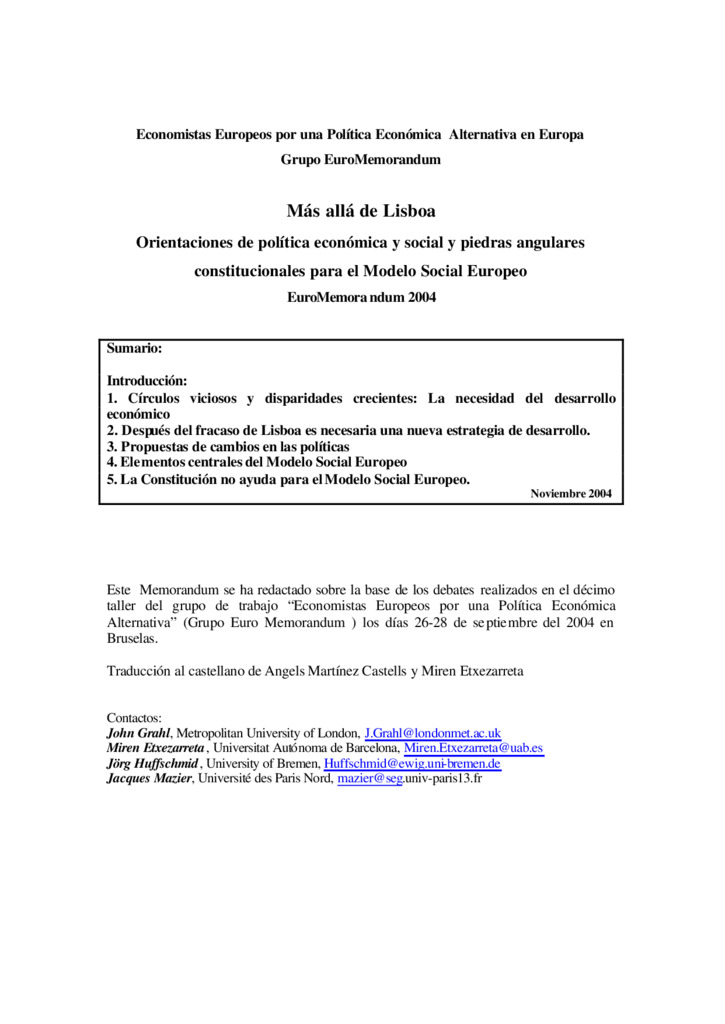 This Memorandum was formulated on the basis of discussions at the 10th workshop of the working group "European Economists for an Alternative Economic Policy” (Euro Memorandum Group) on September 26-28, 2004 in Brussels. The text is available in English, French, German, Hungarian, Italian, Polish and Spanish. Summary Introduction 1. Vicious circles and growing disparities: The need for economic development 2. After the failure of Lisbon: A new development strategy is necessary 3. Proposals for policy changes 4. Core elements of the European Social Model 5. The Constitution: Not helpful for the European Social Model Soucer: EuroMemo
This Memorandum was formulated on the basis of discussions at the 10th workshop of the working group "European Economists for an Alternative Economic Policy” (Euro Memorandum Group) on September 26-28, 2004 in Brussels. The text is available in English, French, German, Hungarian, Italian, Polish and Spanish. Summary Introduction 1. Vicious circles and growing disparities: The need for economic development 2. After the failure of Lisbon: A new development strategy is necessary 3. Proposals for policy changes 4. Core elements of the European Social Model 5. The Constitution: Not helpful for the European Social Model Soucer: EuroMemo -
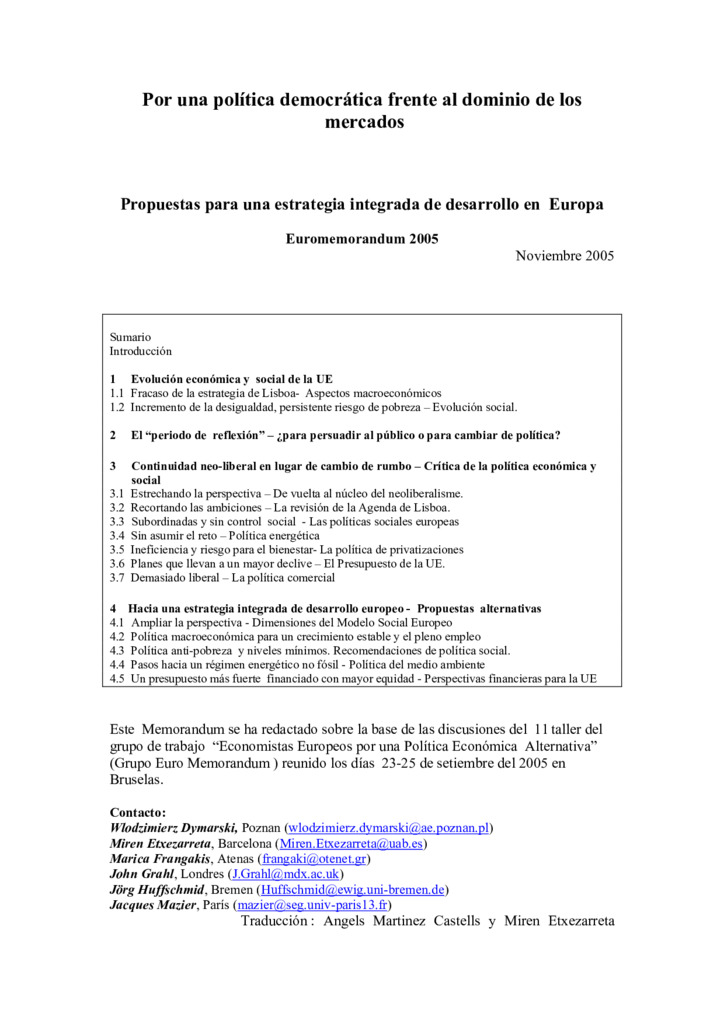 This Memorandum was formulated on the basis of discussions at the 11th workshop of the working group "European Economists for an Alternative Economic Policy” (Euro Memorandum Group) on September 23-25, 2005 in Brussels. The text is available in English, French, German, Greek, Hungarian, Italian, Polish and Spanish. Summary Introduction 1 Economic and social developments in the EU 1.1 Failure of the Lisbon strategy - Macroeconomic developments 1.2 Rising inequality, persistent risk of poverty - Social developments 2 The "period of reflection” - for public persuasion or for a change in policy? 3 Neo-liberal continuity instead of correction - Critique of economic and social policy 3.1 Narrowing the perspective - Back to the core of neo-liberalism 3.2 Curtailed ambitions - The review of the Lisbon Agenda 3.3 Subordinated and without social control - European social policies 3.4 Missing the challenge - Energy policy 3.5 Inefficient and risky for welfare - Privatisation policy 3.6 Counterproductive plans for further decline - The EU Budget 3.7 Too liberal - Trade policy 4 Towards an integrated European development strategy - Proposals for alternatives 4.1 Broadening the perspective - Dimensions of the European Social Model 4.2 Macroeconomic policy for sustainable growth and full employment 4.3 Anti-poverty policy and minimum standards - Social policy recommendations 4.4 Steps towards a non fossil energy regime - Environmental policy 4.5 A stronger budget with more equitable financing - Financial perspectives for the EU Soucer: EuroMemo
This Memorandum was formulated on the basis of discussions at the 11th workshop of the working group "European Economists for an Alternative Economic Policy” (Euro Memorandum Group) on September 23-25, 2005 in Brussels. The text is available in English, French, German, Greek, Hungarian, Italian, Polish and Spanish. Summary Introduction 1 Economic and social developments in the EU 1.1 Failure of the Lisbon strategy - Macroeconomic developments 1.2 Rising inequality, persistent risk of poverty - Social developments 2 The "period of reflection” - for public persuasion or for a change in policy? 3 Neo-liberal continuity instead of correction - Critique of economic and social policy 3.1 Narrowing the perspective - Back to the core of neo-liberalism 3.2 Curtailed ambitions - The review of the Lisbon Agenda 3.3 Subordinated and without social control - European social policies 3.4 Missing the challenge - Energy policy 3.5 Inefficient and risky for welfare - Privatisation policy 3.6 Counterproductive plans for further decline - The EU Budget 3.7 Too liberal - Trade policy 4 Towards an integrated European development strategy - Proposals for alternatives 4.1 Broadening the perspective - Dimensions of the European Social Model 4.2 Macroeconomic policy for sustainable growth and full employment 4.3 Anti-poverty policy and minimum standards - Social policy recommendations 4.4 Steps towards a non fossil energy regime - Environmental policy 4.5 A stronger budget with more equitable financing - Financial perspectives for the EU Soucer: EuroMemo -
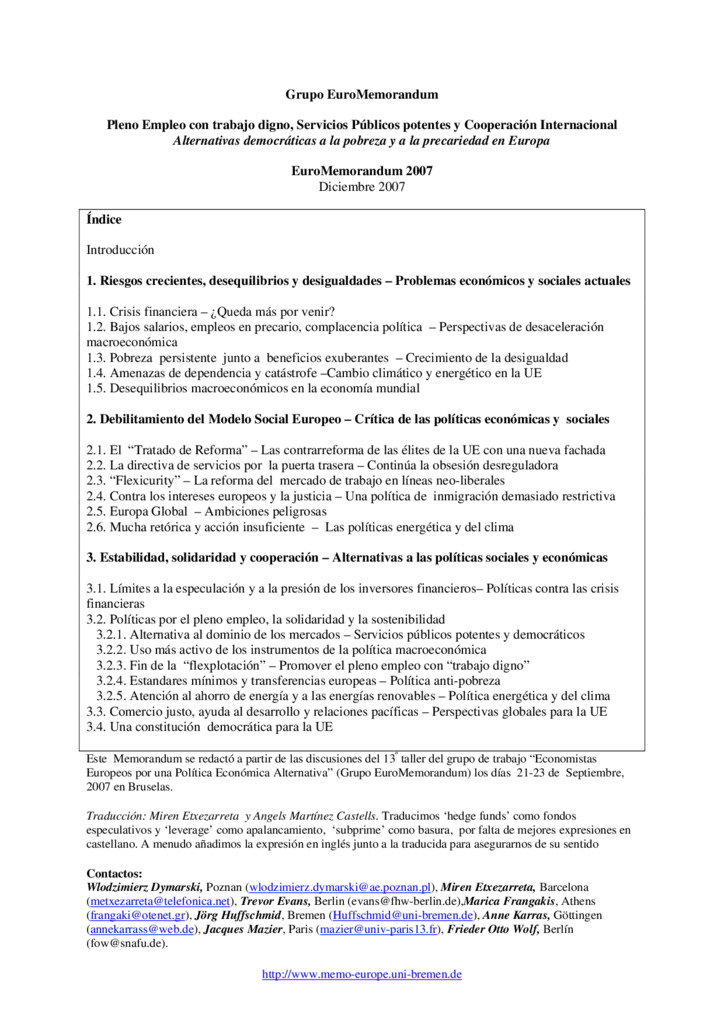 This Memorandum was formulated on the basis of discussions at the 13th workshop of the working group "European Economists for an Alternative Economic Policy” (EuroMemorandum Group) on September 21 - 23, 2007 in Brussels. The text is available in English, French, German, Greek, Hungarian and Spanish. Summary Introduction 1. Enhanced risks, imbalances and inequalities - Current economic and social problems 1.1. Financial crisis - More to come? 1.2. Low wages, precarious jobs, political complacency - Prospects for macro-economic decline 1.3. Persistent poverty amidst exploding profits - Inequality on the rise 1.4. Threats of dependence and catastrophe - Energy and climate change in the EU 1.5. Macroeconomic imbalances in the world economy 2. Undermining the European Social Model - Critique of economic and social policies 2.1. The "Reform Treaty” - The EU elites’ counter-reform under a new cover 2.2. Service directive through the backdoor - The deregulatory obsession continues 2.3. "Flexicurity” - Labour market reform with a neo-liberal bias 2.4. Against European interests and fairness - Too restrictive immigration policy 2.5. Global Europe - Threatening ambitions 2.6. Too little action behind the rhetoric - Climate and energy policies 3. Stability, solidarity and cooperation - Alternatives for economic and social policies 3.1. Limits for speculation and financial investor pressure - Policies against financial crises 3.2. Policies for full employment, solidarity and sustainability 3.2.1. Alternative to the dominance of markets - Strong and democratic public services 3.2.2. More active use of macroeconomic policy tools 3.2.3. End "flexploitation” - Promote full employment with "good work” 3.2.4. Minimum standards and European transfers - Anti-poverty policy 3.2.5. Focus on energy saving and renewables - Climate and energy policies 3.3. Fair trade, development aid and peaceful relations - Global perspectives for the EU 3.4. A democratic constitution for the EU Soucer: EuroMemo
This Memorandum was formulated on the basis of discussions at the 13th workshop of the working group "European Economists for an Alternative Economic Policy” (EuroMemorandum Group) on September 21 - 23, 2007 in Brussels. The text is available in English, French, German, Greek, Hungarian and Spanish. Summary Introduction 1. Enhanced risks, imbalances and inequalities - Current economic and social problems 1.1. Financial crisis - More to come? 1.2. Low wages, precarious jobs, political complacency - Prospects for macro-economic decline 1.3. Persistent poverty amidst exploding profits - Inequality on the rise 1.4. Threats of dependence and catastrophe - Energy and climate change in the EU 1.5. Macroeconomic imbalances in the world economy 2. Undermining the European Social Model - Critique of economic and social policies 2.1. The "Reform Treaty” - The EU elites’ counter-reform under a new cover 2.2. Service directive through the backdoor - The deregulatory obsession continues 2.3. "Flexicurity” - Labour market reform with a neo-liberal bias 2.4. Against European interests and fairness - Too restrictive immigration policy 2.5. Global Europe - Threatening ambitions 2.6. Too little action behind the rhetoric - Climate and energy policies 3. Stability, solidarity and cooperation - Alternatives for economic and social policies 3.1. Limits for speculation and financial investor pressure - Policies against financial crises 3.2. Policies for full employment, solidarity and sustainability 3.2.1. Alternative to the dominance of markets - Strong and democratic public services 3.2.2. More active use of macroeconomic policy tools 3.2.3. End "flexploitation” - Promote full employment with "good work” 3.2.4. Minimum standards and European transfers - Anti-poverty policy 3.2.5. Focus on energy saving and renewables - Climate and energy policies 3.3. Fair trade, development aid and peaceful relations - Global perspectives for the EU 3.4. A democratic constitution for the EU Soucer: EuroMemo -
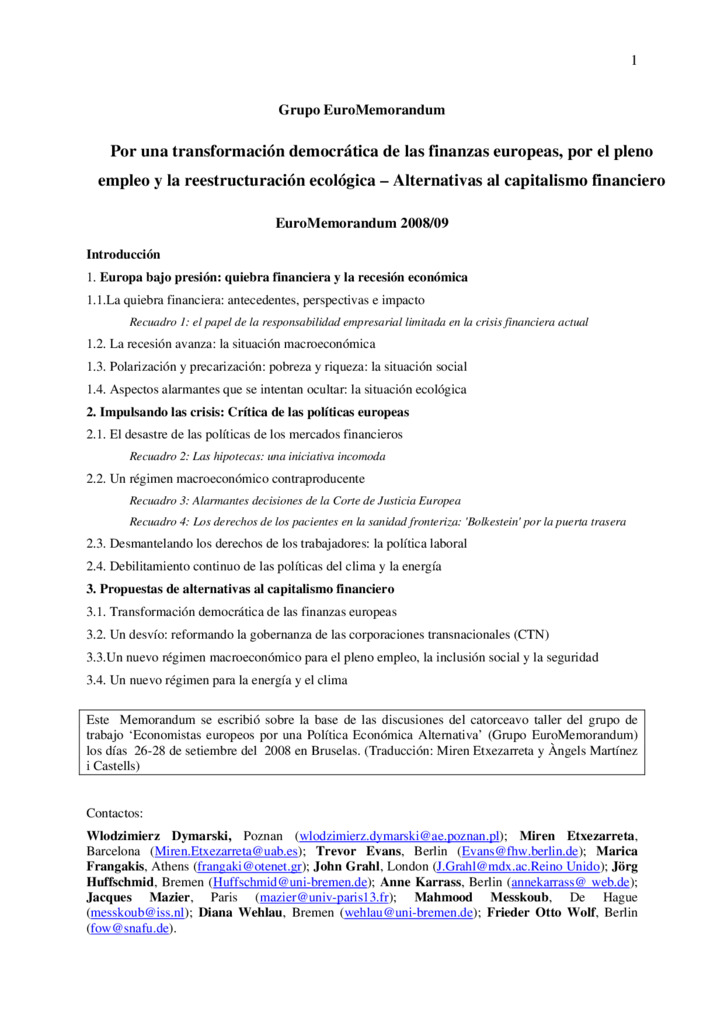 This Memorandum was formulated on the basis of discussions at the 14th workshop of the working group ‘European Economists for an Alternative Economic Policy’ (EuroMemorandum Group) on 26-28 September 2008 in Brussels. It is based on contributions from Elmar Altvater, Stephanie Blankenburg, Trevor Evans, Marica Frangakis, Jörg Huffschmid, Anne Karrass, Florence Palpacuer, Diana Wehlau and Frieder Otto Wolf. The text is available in English, German, Greek, Slovenian and Spanish. Summary Introduction 1. Europe under pressure: Financial meltdown and economic recession 1.1 The financial meltdown: Background, perspectives and impact Box 1: The role of corporate limited liability in the current financial crisis 1.2 Oncoming recession: The macroeconomic situation 1.3 Polarisation and precarisation; poverty and wealth: The social situation 1.4 Alarming developments pushed to the background: The ecological situation 2. Promotion of crises: Critique of European policies 2.1 The disaster of financial market policies Box 2: Mortgages - An embarassing initiative 2.2 The counterproductive macro-regime Box 3: Alarming decisions by the European Court of Justice Box 4: Patients' rights in cross-border healthcare: 'Bolkestein' through the backdoor 2.3 Dismantling of workers rights through labour market policy 2.5 Continuing weaknes of climate and energy policies 3. Proposals for alternatives to finance-driven capitalism 3.1 Democratic transformation of European finance 3.2 Excursion: Reforming Governance in Transnational Corporations (TNCs) 3.3 A new macro-regime for full employment, social inclusion and security 3.4 A new regime on energy and climate Soucer: EuroMemo
This Memorandum was formulated on the basis of discussions at the 14th workshop of the working group ‘European Economists for an Alternative Economic Policy’ (EuroMemorandum Group) on 26-28 September 2008 in Brussels. It is based on contributions from Elmar Altvater, Stephanie Blankenburg, Trevor Evans, Marica Frangakis, Jörg Huffschmid, Anne Karrass, Florence Palpacuer, Diana Wehlau and Frieder Otto Wolf. The text is available in English, German, Greek, Slovenian and Spanish. Summary Introduction 1. Europe under pressure: Financial meltdown and economic recession 1.1 The financial meltdown: Background, perspectives and impact Box 1: The role of corporate limited liability in the current financial crisis 1.2 Oncoming recession: The macroeconomic situation 1.3 Polarisation and precarisation; poverty and wealth: The social situation 1.4 Alarming developments pushed to the background: The ecological situation 2. Promotion of crises: Critique of European policies 2.1 The disaster of financial market policies Box 2: Mortgages - An embarassing initiative 2.2 The counterproductive macro-regime Box 3: Alarming decisions by the European Court of Justice Box 4: Patients' rights in cross-border healthcare: 'Bolkestein' through the backdoor 2.3 Dismantling of workers rights through labour market policy 2.5 Continuing weaknes of climate and energy policies 3. Proposals for alternatives to finance-driven capitalism 3.1 Democratic transformation of European finance 3.2 Excursion: Reforming Governance in Transnational Corporations (TNCs) 3.3 A new macro-regime for full employment, social inclusion and security 3.4 A new regime on energy and climate Soucer: EuroMemo -
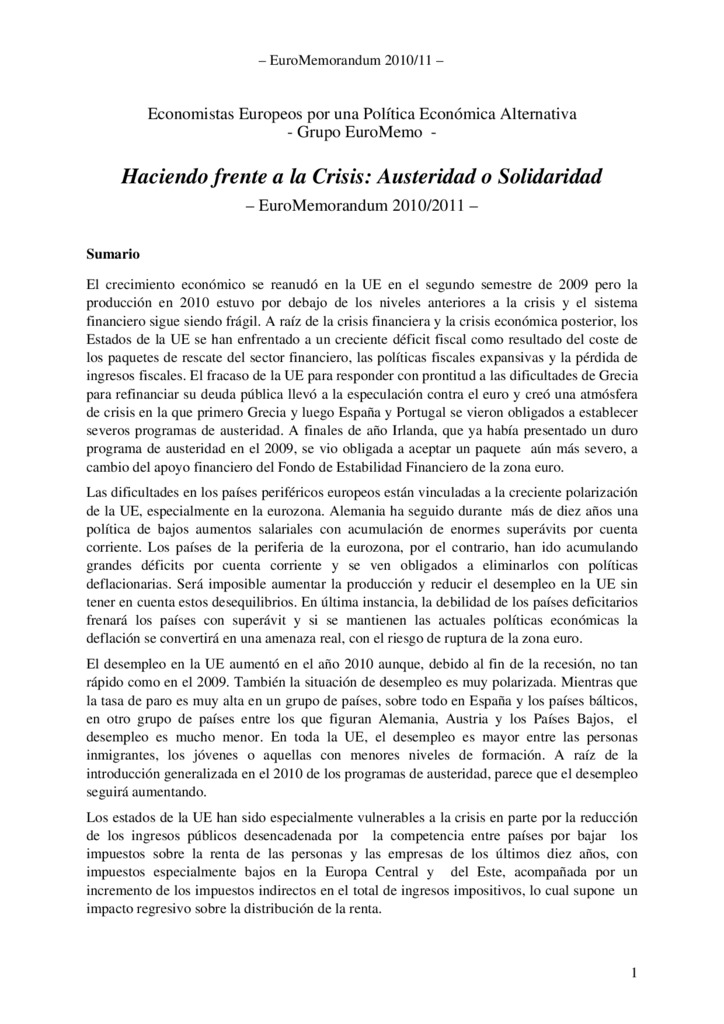 More than 400 economists have declared that they support the general direction, main arguments and proposals of the EuroMemorandum 2010/2011 (see list of signatories). Printed versions of the EuroMemorandum 2010/11 available The EuroMemorandum Confronting the Crisis: Austerity or Solidarity is now available as booklet in English, French and German. To order printed versions, please contact transform!europe (for the English version), Espaces Marx for the French version (3 Euro) or Zeitschrift Sozialismus (7,20 Euro) for the German version. This EuroMemorandum was formulated on the basis of discussions at the 16th workshop on Alternative Economic Policy in Europe, organised by the EuroMemo Group, on 24-26 September 2010 in Rethymnon, Greece. It was written by Wilfried Altzinger, Stephanie Blankenburg, Hermann Bömer, Trevor Evans, Marica Frangakis, John Grahl, Maria Karamessini, Jeremy Leaman, Dominique Plihon, Gunter Quaißer, David Vetterli, Diana Wehlau and Frieder Otto Wolf. Soucer: EuroMemo
More than 400 economists have declared that they support the general direction, main arguments and proposals of the EuroMemorandum 2010/2011 (see list of signatories). Printed versions of the EuroMemorandum 2010/11 available The EuroMemorandum Confronting the Crisis: Austerity or Solidarity is now available as booklet in English, French and German. To order printed versions, please contact transform!europe (for the English version), Espaces Marx for the French version (3 Euro) or Zeitschrift Sozialismus (7,20 Euro) for the German version. This EuroMemorandum was formulated on the basis of discussions at the 16th workshop on Alternative Economic Policy in Europe, organised by the EuroMemo Group, on 24-26 September 2010 in Rethymnon, Greece. It was written by Wilfried Altzinger, Stephanie Blankenburg, Hermann Bömer, Trevor Evans, Marica Frangakis, John Grahl, Maria Karamessini, Jeremy Leaman, Dominique Plihon, Gunter Quaißer, David Vetterli, Diana Wehlau and Frieder Otto Wolf. Soucer: EuroMemo -
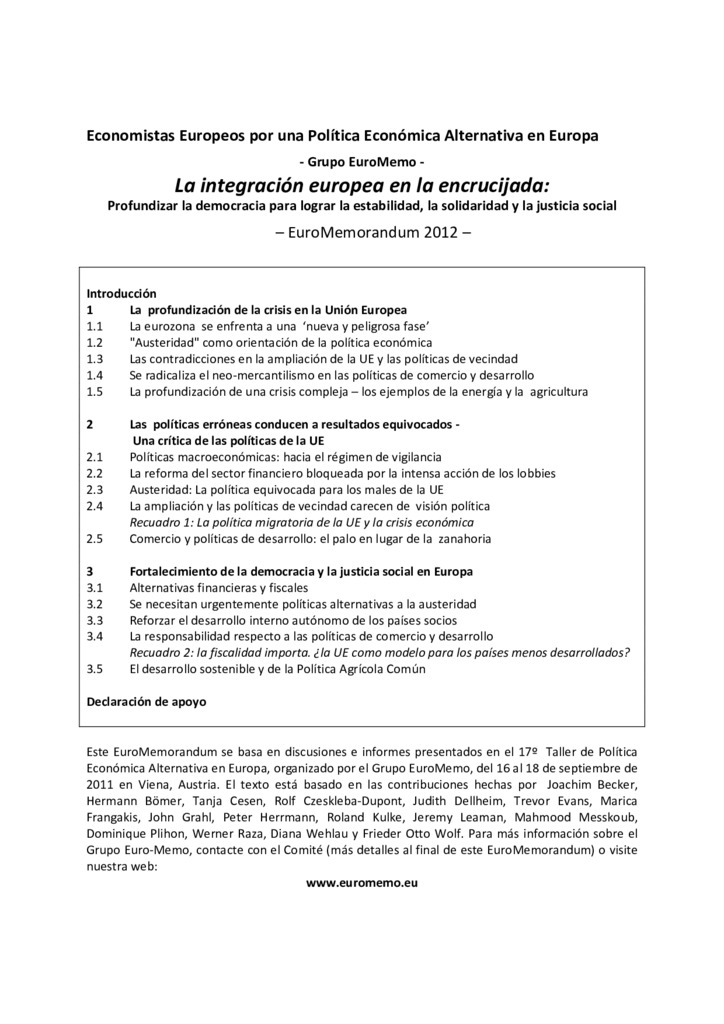 This EuroMemorandum seeks to set out a critical analysis of recent economic developments in Europe and to present the basis for possible alternative policies. It is intended as a contribution to the critical discussion in intellectual and social movements in Europe, and in solidarity with all those struggling against the impact of the deeply regressive, anti-social policies of the European authorities. Please download the new EuroMemorandum here. More than 450 economists and social scientists from all over Europe and beyond have declared their support for the new EuroMemorandum (click here for the list of signatories). Long versions of the EuroMemorandum are also available in French: L'intégration européenne à la croisée des chemins German: Europäische Integration am Scheideweg Greek: Η ευρωπαϊκή ολοκλήρωση σε σταυροδρόμ Spanish: La integración europea en la enrucijada Please let other people know about the EuroMemorandum! Printed versions of the EuroMemorandum 2012 The EuroMemorandum "European integration at the crossroads: Democratic deepening for stability, solidarity and social justice" is now available as booklet in English, French and German. To order printed versions, please contact transform!europe (for the English version), Espaces Marx for the French version (3 Euro) or Zeitschrift Sozialismus (7,20 Euro) for the German version. This EuroMemorandum draws on discussions and papers presented at the 17th Workshop on Alternative Economic Policy in Europe, organised by the EuroMemo Group, on 16-18 September 2011 in Vienna, Austria. The text is based on contributions from Joachim Becker, Hermann Bömer, Tanja Cesen, Rolf Czeskleba-Dupont, Judith Dellheim, Trevor Evans, Marica Frangakis, John Grahl, Peter Herrmann, Roland Kulke, Jeremy Leaman, Mahmood Messkoub, Dominique Plihon, Werner Raza, Diana Wehlau and Frieder Otto Wolf. Soucer: EuroMemo
This EuroMemorandum seeks to set out a critical analysis of recent economic developments in Europe and to present the basis for possible alternative policies. It is intended as a contribution to the critical discussion in intellectual and social movements in Europe, and in solidarity with all those struggling against the impact of the deeply regressive, anti-social policies of the European authorities. Please download the new EuroMemorandum here. More than 450 economists and social scientists from all over Europe and beyond have declared their support for the new EuroMemorandum (click here for the list of signatories). Long versions of the EuroMemorandum are also available in French: L'intégration européenne à la croisée des chemins German: Europäische Integration am Scheideweg Greek: Η ευρωπαϊκή ολοκλήρωση σε σταυροδρόμ Spanish: La integración europea en la enrucijada Please let other people know about the EuroMemorandum! Printed versions of the EuroMemorandum 2012 The EuroMemorandum "European integration at the crossroads: Democratic deepening for stability, solidarity and social justice" is now available as booklet in English, French and German. To order printed versions, please contact transform!europe (for the English version), Espaces Marx for the French version (3 Euro) or Zeitschrift Sozialismus (7,20 Euro) for the German version. This EuroMemorandum draws on discussions and papers presented at the 17th Workshop on Alternative Economic Policy in Europe, organised by the EuroMemo Group, on 16-18 September 2011 in Vienna, Austria. The text is based on contributions from Joachim Becker, Hermann Bömer, Tanja Cesen, Rolf Czeskleba-Dupont, Judith Dellheim, Trevor Evans, Marica Frangakis, John Grahl, Peter Herrmann, Roland Kulke, Jeremy Leaman, Mahmood Messkoub, Dominique Plihon, Werner Raza, Diana Wehlau and Frieder Otto Wolf. Soucer: EuroMemo -
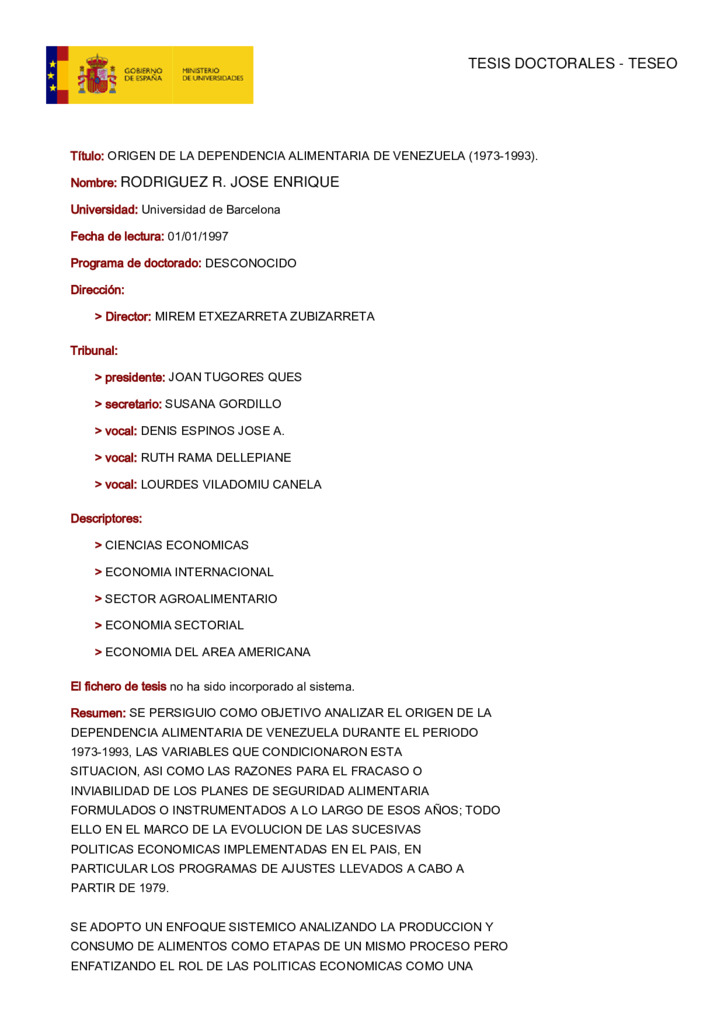 Título: Origen de la dependencia alimentaria de Venezuela (1973-1993) Nombre: Rodriguez R. Jose Enrique Universidad: Universidad De Barcelona Fecha De Lectura: 01/01/1997 Dirección: Director: Miren Etxezarreta Zubizarreta Tribunal: Presidente: Joan Tugores Ques Secretario: Susana Gordillo Vocal: Denis Espinos Jose A. Vocal: Ruth Rama Dellepiane Vocal: Lourdes Viladomiu Canela
Título: Origen de la dependencia alimentaria de Venezuela (1973-1993) Nombre: Rodriguez R. Jose Enrique Universidad: Universidad De Barcelona Fecha De Lectura: 01/01/1997 Dirección: Director: Miren Etxezarreta Zubizarreta Tribunal: Presidente: Joan Tugores Ques Secretario: Susana Gordillo Vocal: Denis Espinos Jose A. Vocal: Ruth Rama Dellepiane Vocal: Lourdes Viladomiu Canela -
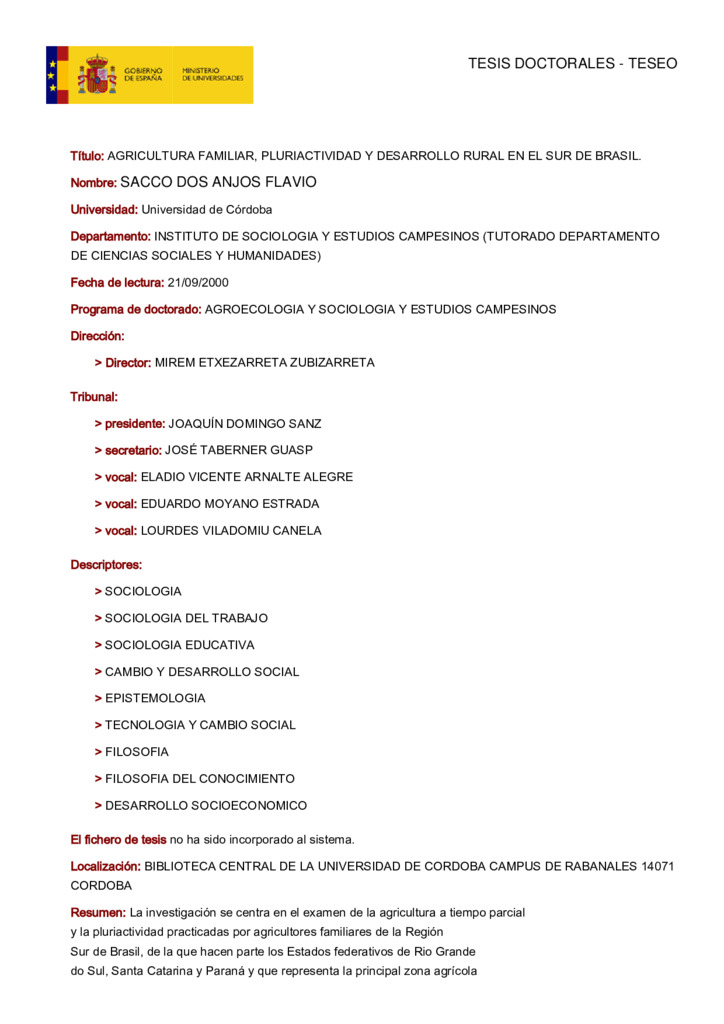 Título: Agricultura Familiar, Pluriactividad Y Desarrollo Rural En El Sur De Brasil. Nombre: Sacco Dos Anjos Flavio Universidad: Universidad De Córdoba Departamento: Instituto De Sociologia Y Estudios Campesinos (Tutorado Departamento De Ciencias Sociales Y Humanidades) Fecha De Lectura: 21/09/2000 Programa De Doctorado: Agroecologia Y Sociologia Y Estudios Campesinos Dirección: Director: Miren Etxezarreta Zubizarreta Tribunal: Presidente: Joaquín Domingo Sanz Secretario: José Taberner Guasp Vocal: Eladio Vicente Arnalte Alegre Vocal: Eduardo Moyano Estrada Vocal: Lourdes Viladomiu Canela
Título: Agricultura Familiar, Pluriactividad Y Desarrollo Rural En El Sur De Brasil. Nombre: Sacco Dos Anjos Flavio Universidad: Universidad De Córdoba Departamento: Instituto De Sociologia Y Estudios Campesinos (Tutorado Departamento De Ciencias Sociales Y Humanidades) Fecha De Lectura: 21/09/2000 Programa De Doctorado: Agroecologia Y Sociologia Y Estudios Campesinos Dirección: Director: Miren Etxezarreta Zubizarreta Tribunal: Presidente: Joaquín Domingo Sanz Secretario: José Taberner Guasp Vocal: Eladio Vicente Arnalte Alegre Vocal: Eduardo Moyano Estrada Vocal: Lourdes Viladomiu Canela
